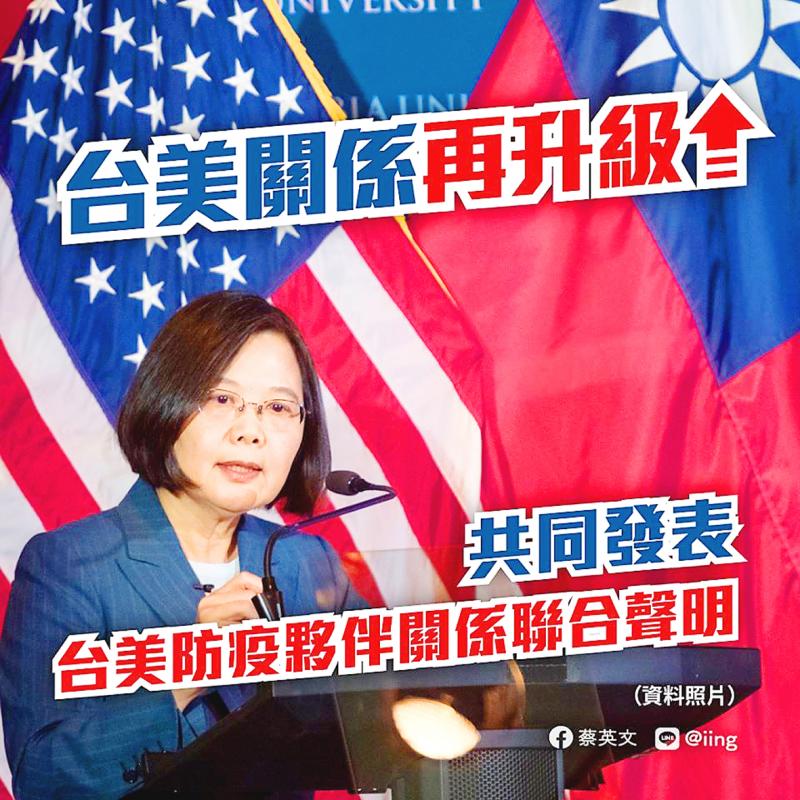Taiwan and the US are to combat the COVID-19 pandemic together, with the partnership including medicine development, contact tracing technology and the exchange of medical supplies, the American Institute in Taiwan (AIT) and the Ministry of Foreign Affairs said in a joint statement yesterday.
The statement, signed by AIT Director Brent Christensen and Minister of Foreign Affairs Joseph Wu (吳釗燮), said: “To further strengthen US-Taiwan consultation and cooperation on combating the COVID-19 virus, which originated in Wuhan, both sides will seek to share best practices and cooperate on a range of activities.”
Following the AIT’s statement on Sunday, which said that both sides would cooperate on developing vaccines and medicine to combat “the Wuhan coronavirus,” yesterday’s statement again highlighted the virus’ Chinese origin.

Screen grab from Tsai Ing-wen’s Facebook page
The statement also listed six areas of bilateral collaboration: research and development of rapid tests; research and development of vaccines; research and development of medicines; contact tracing techniques and technology; joint conferences with scientists and experts; and cooperation and exchanges of medical supplies and equipment.
The US has prepared for Taiwan the raw materials required to make 300,000 protective outfits, while Taiwan — when its mask supplies are stable — is to send 100,000 masks per week to the US, Wu told a news conference at the Central Epidemic Command Center (CECC).
Wu said the AIT has contacted Academia Sinica to discuss the prospect of working together.
Since late last month, Academia Sinica has announced several breakthroughs, such as developing antibodies for a rapid immune-based test kit and synthesizing the drug remdesivir, a potential candidate for treating the coronavirus.
The AIT yesterday posted a photograph on Facebook showing Christensen and Academia Sinica President James Liao (廖俊智) meeting on Tuesday, saying that they discussed the many ways in which the US and Taiwan could improve health cooperation.
“Academia Sinica’s achievements and expertise are impressive, including its development of an innovative new rapid test for COVID-19. The United States can benefit greatly from this partnership with the people of Taiwan,” the AIT wrote, adding the hashtags “RealFriendsRealProgress” and “StriveTogetherThriveTogether.”
Academia Sinica later yesterday also posted on Facebook a photograph of Liao meeting Christensen.
Academia Sinica wrote that last month, it convened its researchers and members from universities, other institutes and government bodies to form a platform to combat COVID-19, expressing the hope of maximizing research by working with the US and global partners.
Separately yesterday, European Economic and Trade Office Director Filip Grzegorzewski wrote on Twitter that “#EU and #Taiwan Academia Sinica [are] working together on the most advanced rapid tests and vaccines for #COVID. With 15-minutes reliable tests, we will defeat #coronavirus.”

PREPAREDNESS: Given the difficulty of importing ammunition during wartime, the Ministry of National Defense said it would prioritize ‘coproduction’ partnerships A newly formed unit of the Marine Corps tasked with land-based security operations has recently replaced its aging, domestically produced rifles with more advanced, US-made M4A1 rifles, a source said yesterday. The unnamed source familiar with the matter said the First Security Battalion of the Marine Corps’ Air Defense and Base Guard Group has replaced its older T65K2 rifles, which have been in service since the late 1980s, with the newly received M4A1s. The source did not say exactly when the upgrade took place or how many M4A1s were issued to the battalion. The confirmation came after Chinese-language media reported

A Ministry of Foreign Affairs official yesterday said that a delegation that visited China for an APEC meeting did not receive any kind of treatment that downgraded Taiwan’s sovereignty. Department of International Organizations Director-General Jonathan Sun (孫儉元) said that he and a group of ministry officials visited Shenzhen, China, to attend the APEC Informal Senior Officials’ Meeting last month. The trip went “smoothly and safely” for all Taiwanese delegates, as the Chinese side arranged the trip in accordance with long-standing practices, Sun said at the ministry’s weekly briefing. The Taiwanese group did not encounter any political suppression, he said. Sun made the remarks when

The Taiwanese passport ranked 33rd in a global listing of passports by convenience this month, rising three places from last month’s ranking, but matching its position in January last year. The Henley Passport Index, an international ranking of passports by the number of designations its holder can travel to without a visa, showed that the Taiwan passport enables holders to travel to 139 countries and territories without a visa. Singapore’s passport was ranked the most powerful with visa-free access to 192 destinations out of 227, according to the index published on Tuesday by UK-based migration investment consultancy firm Henley and Partners. Japan’s and

BROAD AGREEMENT: The two are nearing a trade deal to reduce Taiwan’s tariff to 15% and a commitment for TSMC to build five more fabs, a ‘New York Times’ report said Taiwan and the US have reached a broad consensus on a trade deal, the Executive Yuan’s Office of Trade Negotiations said yesterday, after a report said that Washington is set to reduce Taiwan’s tariff rate to 15 percent. The New York Times on Monday reported that the two nations are nearing a trade deal to reduce Taiwan’s tariff rate to 15 percent and commit Taiwan Semiconductor Manufacturing Co (TSMC, 台積電) to building at least five more facilities in the US. “The agreement, which has been under negotiation for months, is being legally scrubbed and could be announced this month,” the paper said,